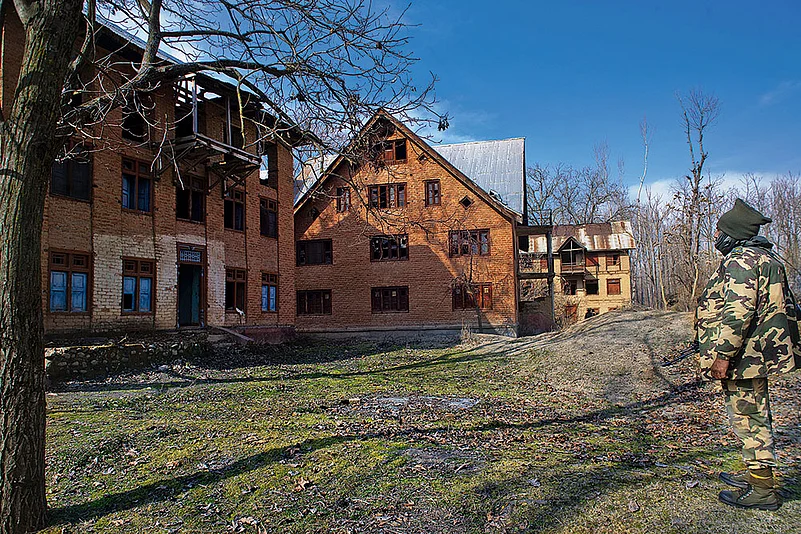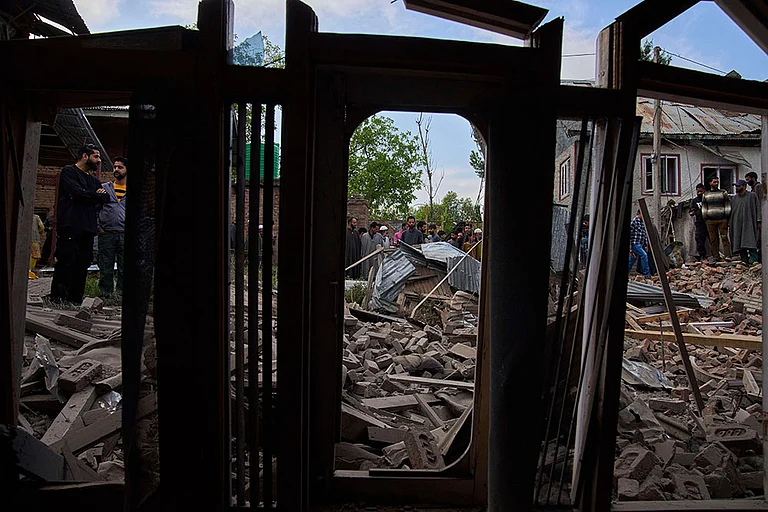If you were a Pandit (Hindu) in Kashmir in 1989 and 1990 and didn’t know the six Kalimas by heart, you were at the mercy of Muslim mercenaries whose job was to get rid of you at even the faintest sight. We didn’t have to make any effort to memorise the Kalimas. Because we were constantly exposed to the Kalimas right from our infancy, we knew them by heart. They were common household parlance for precautionary purposes.
Kashmiri Pandit women were compelled to give up wearing the bindi, the dejhor (a traditional ornament worn by married Pandit women), and saris especially when outside. Pandit men were forced to grow beards to look like Muslims. Other obvious religious markers in attire, appearance and language that would give away our real identity were concealed to avert the unthinkable.
The mercenaries were crafty. They resorted to tactics such as ordering us to strip publicly at gunpoint. In front of other people, including women. To check for circumcision to ascertain religious identity. After all, we were faced with eviction orders because Kashmir was to be cleansed of kafirs. ‘Embrace Islam or else face the bullet’ was the diktat. We had decided. It is better to leave than be inflicted with more and more humiliation day after day. Our only prayer: God save people from such dehumanisation.
Picture this: 1989, Kashmir. You step out of your house for essential work. Your goal is to conceal your Pandit identity and resemble a Muslim if you must return home safe and with dignity. A gun-wielding man comes out of nowhere, confronts you, suspects you are a Hindu, and asks you your name. You say Ghuam Nabi with conviction and pretend to be brave. Then, with the nozzle of a Kalashnikov or AK-47 pointed at your forehead and with the finger ready to pull the trigger, he asks you to recite the Kalima. If you misrecite or mispronounce because of fear or some other reason, though you have practised such things and prepared yourself for such situations daily, you can’t even imagine what might happen to you. You don’t leave your survival to chance or fate. You have got to know how to protect yourself because no one else will. Not even the security forces or your Muslim friends and neighbours. You have been left to fend for yourself. Why must anyone risk their lives to protect you?
The mercenary forces you to strip. It is your last chance. If you are circumcised, then he might pardon you because he is now convinced that you are a Hindu who has converted to Islam. You can’t fool a well-trained radicalised Islamist mercenary who can very easily tell a Hindu from a Muslim even with eyes closed and whose job is to kill Hindus without even the slightest doubt.
These men have been trained exceptionally well at jihad factories in Pakistan and Kashmir. They don’t hesitate. They roam freely to kill us (infidels) and carry out routine human things like eating, laughing, sleeping, and praying. Killing for them is more banal than lazing around.
Such was the humiliation we were compelled to endure every day outside our homes and on the streets of Kashmir in 1989 and 1990. What choice did we have? What would you have done if you were in our place?
There are other humiliating incidents from those days that we shudder to even tell ourselves, let alone others. They should never be revealed to anyone. Such is the nature of those dark things that we were made to go through and endure. Their remembrance—the most painful thing in life. But they shouldn’t be forgotten either. They are the truths of our history. They are the only evidence of the inhuman and degrading acts done against us and the only evidence that some of us survived against all odds. These truths are also the sentries, which will guard our future generations from civilisational obliteration and oblivion.
***
Three generations later, in our very lifetime, the third-generation mercenaries are back with unimaginable vengeance. They are as deadly and full of hate as their predecessors. They are hell-bent on finishing the unfinished agenda—to keep killing Hindus in Kashmir from time to time so that no Hindu will dare think of ever going to Kashmir. Even for a day.
One wishes the tourists who were happily picnicking in Pahalgam, Kashmir, on April 22 had recited the Kalima perfectly without even a single mistake. One wishes that the killers had taken them for Muslim men, women and children. The fate of those families would not have been altered forever for generations to come. The monstrosity was even filmed by the killers for the rest of the world to see. Such is their hatred of Hindus who they believe are worse than vermin and don’t deserve to exist and have no place in Kashmir. ‘When you spot them, kill them in the goriest of ways’ is the brief they have from their spineless masters.
This hasn’t happened the first time. Such beastly and sinful acts have happened again and again for more than three decades now. The massacre of Hindu tourists in Pahalgam is one more addition to the countless massacres of Hindus for whom Kashmir is forbidden.
How will the children and family members of those killed remember Kashmir now? Will they ever be able to go there or anywhere else for a holiday? The word ‘holiday’ might haunt them forever and be rendered meaningless.
***
How will we ever go to Kashmir? How must we reflect on this abomination of killing Hindus in Kashmir? What must we do? We continue to vacillate between fear and hope. Fear of losing Kashmir forever and hope of seeing the end of hatred and violence in our lifetimes so that we get to go back and roam and sleep peacefully there. I dream of such sleep.
For how long do I have to keep writing about hatred and killings and violence and pain and misery and despair? About innocent lives made to end abruptly when they are just about to flourish. About hope and love made to perish mercilessly as though they were forbidden things. For how long do we cry silently and helplessly at our fate? Look what has happened. Is this the end of hope?
I dream of writing about beauty and happiness and love once again, as I did when I was growing up in Kashmir in the 80s. When all that our parents and grandparents had dreamt of was a life of beauty and joy in our beloved Kashmir.
Will that day ever come? Not just for me, but for everyone else as well.
(Views expressed are personal)
Siddhartha Gigoo is the author of several books, including his most recent, A Long Season of Ashes
This article is part of 바카라라이브 바카라 May 11, 2025 issue, covering the Pahalgam terror attack and the old wounds it has reopened. It appeared in print as ‘For How Long ?
















